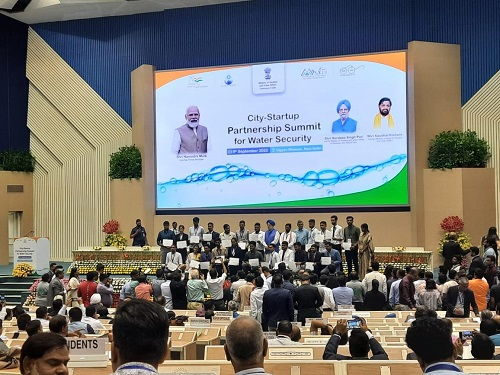
New Delhi: A committee was formed by the Ministry of Housing and Urban Affairs (MoHUA)The government of India (GoI) has selected the picture taken by Insaram Ahmed Khan, a student of B.Arch - IVth year, Faculty of Architecture and Ekistics, Jamia Millia Islamia (JMI) among the best 25 photographs taken from over 5000 photographs sent in by students from National Institutes. He was felicitated today at a ceremony organized by the MoHUA at Vigyan Bhawan, Delhi where he received a certificate from Hon'ble Minister of Housing and Urban Affairs: Shri Hardeep Singh Puri, Hon'ble Minister of State for Housing and Urban Affairs: Shri Kaushal Kishore and Secretary, MoHUA: Manoj Joshi and Additional Secretary, MoHUA: D Thara
Under the aegis of the AmritSarovarr Mission- Jal Dharohar Sanrakshan Internship program, an individual photography competition was held in which 25 photographs that best captured the essence of the assigned water bodies were selected.
Insaram is part of the two teams from the Faculty of Architecture and Ekistics who worked on the water body projects- Rajaon ki Baoli and Baoli at Feroz Shah Kotla. The two projects are part of the Government of India - Mission Amrit Sarovar :Jal Dharohar Sanrakshan where students worked on select culturally and historically significant water bodies across the country.
As part of the mission, the water bodies were assigned by AICTE to carry out studies and propose strategies for rejuvenating and preserving traditional local water bodies to ensure water security and community development.
The internship lasted over the course of a month, wherein both teams conducted multiple site visits in order to fully comprehend the functioning of their respective baolis, while at the same time documenting the existing condition of the heritage structures to come up with strategies for its conservation.
Discussions and interactions with the locals residing in the vicinity of the sites, as well as visitors who frequented the site, were also conducted to envisage their aspirations of making the site more accessible for public use. The subsequent responses were incorporated as planned interventions for the sites.
Click Here for More Latest News
